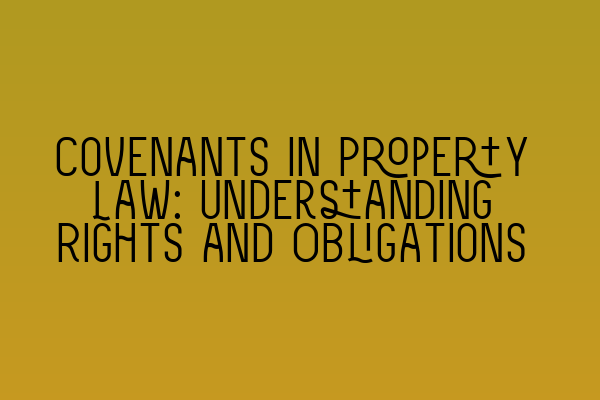Covenants in Property Law: Understanding Rights and Obligations
Welcome to SQE Property Law & Land Law, where our team of expert solicitors specialize in providing comprehensive legal services related to property law. In this blog post, we will dive deep into the topic of covenants in property law and help you understand the rights and obligations associated with them. Whether you are a property owner, buyer, or someone looking to expand your knowledge in property law, this post is tailored for you.
What are Covenants in Property Law?
In property law, covenants refer to specific conditions or restrictions imposed on a property by the original owner or a previous owner. These conditions are binding and should be adhered to by subsequent owners. Covenants can exist in various forms, such as positive covenants, negative covenants, freehold covenants, leasehold covenants, and restrictive covenants.
Positive covenants impose obligations on the property owner to perform certain actions. For example, maintaining the garden or contributing to the maintenance costs of shared facilities. On the other hand, negative covenants restrict the property owner from engaging in particular activities, like running a business from the property or altering its appearance without permission.
Rights and Obligations
When it comes to covenants, understanding the rights and obligations is crucial for all parties involved. Property owners must be aware of the covenants attached to their property, while potential buyers should conduct thorough due diligence to ensure they can comply with the covenants post-purchase. As a property law expert, we can offer guidance and support in interpreting and enforcing covenants to protect your interests.
It’s important to note that covenants run with the land, meaning that they are binding on all future owners of the property. Before purchasing a property, it’s essential to review the title deeds and any relevant documentation to identify any existing covenants. Failure to comply with covenants could result in legal action and financial consequences.
Enforcement of Covenants
If a covenant is breached, the affected party has the right to seek legal remedies. However, the enforceability of covenants depends on various factors, including the nature of the covenant, the intention of the parties involved, and any provisions outlined in the original contract or deed. Solicitors at SQE Property Law & Land Law can provide expert advice on the enforceability of covenants and assist in resolving disputes related to them.
Importance of Professional Legal Advice
Professional legal advice plays a crucial role in understanding and navigating the complexities of covenants in property law. Our team of solicitors at SQE Property Law & Land Law possesses extensive experience in handling property-related matters and can provide you with expert guidance tailored to your specific situation.
To learn more about our services and how we can assist you in matters related to property law, we encourage you to explore our website and consider enrolling in our SQE 1 Preparation Courses and SQE 2 Preparation Courses. These courses will equip you with the necessary knowledge and skills to excel in the SQE exams and embark on a successful legal career. Don’t forget to check out the SRA SQE Exam Dates to stay updated on the exam schedule.
For further practice, you can also access our SQE 1 Practice Exam Questions and SQE 1 Practice Mocks FLK1 FLK2 to test your understanding and boost your confidence.
Thank you for visiting SQE Property Law & Land Law, the leading experts in property law. If you have any questions or require legal assistance, please don’t hesitate to contact us. We are here to help!
